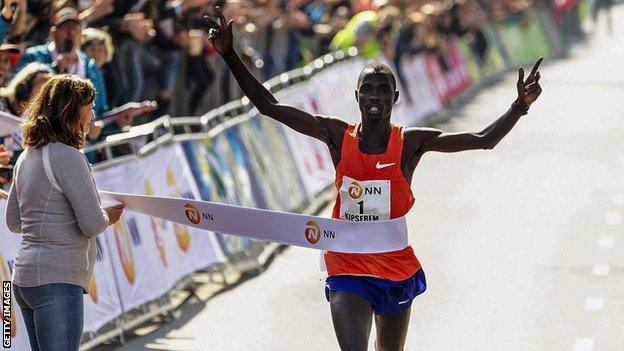Marius Kipserem: Kenyan marathon runner gets three-year ban for use of EPO
- Published

Marius Kipserem is a two-time winner of the Rotterdam Marathon, and finished second in last year's race
Kenyan marathon runner Marius Kipserem has been handed a three-year ban from athletics following a doping violation.
The presence of the prohibited substance recombinant erythropoietin (EPO) was found in a sample provided by the 34-year-old in August.
The Athletics Integrity Unit (AIU) said Kipserem had twice denied doping, before then admitting his guilt on 11 October.
A potential four-year sanction for the use of EPO was reduced by a year following his admission.
His ban has been backdated to 22 September, when Kipserem - a winner of the Rotterdam marathon in both 2016 and 2019 - was provisionally suspended.
His sole competitive result since his positive test, a sixth-placed finish at last month's Sydney Marathon, has been disqualified and he will forfeit any prize money or appearance fee awarded.
EPO is a man-made version of natural erythropoietin and improves athletic performance by stimulating the production of more red blood cells.
Kenyan athletics has been rocked by a number of doping cases this year, with 16 athletes from the East African country being suspended by the AIU for a range of violations.
A further eight Kenyans have been provisionally suspended, with the outcomes of their cases pending.
Under anti-doping measures which came into force in 2019, athletes from countries deemed to have the highest doping risk - which are classed as 'Category A' federations - have to undergo at least three tests in the 10 months prior to a major event to be able to compete there.
Along with fellow African nations Ethiopia, Morocco and Nigeria, Kenya are among the seven countries deemed Category A by the AIU.
Four lives get fatally intertwined: Watch Steven Moffat's devilish thriller starring David Tennant, Dolly Wells, Lydia West and Stanley Tucci
Do George Clooney and Julia Roberts like rom-coms? They open their hearts to Ali Plumb...